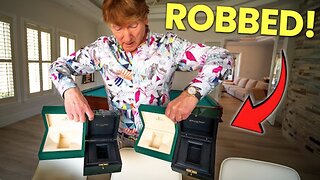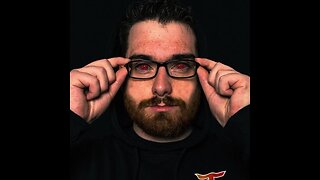Premium Only Content

Polish Genius : Siegmund Lubin
Siegmund Lubin: A Pole Who Made Films, Shrunk Projectors, and Irritated Edison. Born in the Prussian partition as Zygmunt Lubszyński, in Berlin he became Siegmund, and in America Lubin. Under this name he became famous as a pioneer of cinema, inventor, film entrepreneur, director, actor and producer, and also - unfortunately - one of the precursors of the inglorious tradition of intellectual piracy. Although Siegmund Lubin lived and worked in Philadelphia, over four thousand kilometers from Hollywood, his inventions, style of operation and film output had a significant impact on the future of the Dream Factory. He was one of the enthusiasts of cinematography in an era when no one predicted that films would be as successful as they were. Like other pioneers of cinema, Lubin turned out to be a prophet of audiovisual culture. iegmund Lubin manipulated his birth certificate so often that it is not certain whether he was born in 1851, 1854 or 1856. Even his family does not know, but they claim that he definitely subtracted 10 years from his age (although it is still not known from which of these dates). It is also not entirely certain whether he was born near Wrocław or Poznań. It is certain that his large Jewish family barely made ends meet, that he was raised in Berlin, that he studied ophthalmology in Heidelberg and that from his youth he wanted to do business in the United States. In 1868 he sailed to America to sell trinkets to Indians, but he was a failure and returned poorer than he had left.
He tried his luck again in 1876. This time he took $12 and a suitcase full of glasses. In the years that followed, he traded lenses and frames and practiced ophthalmology, married, and traveled around America, driven by a desire to make a fortune and fascinated by electricity and the fledgling technology of projecting images on a screen. Around 1881, he changed his name from the Polish-sounding "Lubszyński" to "Lubin." It was during this period that he finally began to prosper in business. But he wanted more in life than selling glasses.
At flea markets and during various exhibitions, Lubin's attention was drawn to inventions that could display or show static and moving images. Soon, in addition to ophthalmology, he was involved in the production of so-called magic lanterns, projectors of stationary slides used for educational and entertainment purposes. Next came the zoopraxiscope, the ancestor of the cinematograph, a device for displaying animation on a rapidly rotating wheel with painted "frames". Later, he became fascinated by a projector called the phantoscope, the rights to which were acquired - not entirely honestly - by the famous Thomas Alva Edison, who after minor modifications patented it as the "Edison vitascope".
Soon he set up an amateur film studio in the backyard of his Philadelphia home and began producing films, which sometimes caused panic and sometimes outrage among the neighbors. When he made a film about the suffering of Christ, the actor in the title role attracted crowds of followers for a long time, who believed in the film make-up.
Pirate Wars
The era of inventions related to cinematography is a period of predatory capitalism, a feverish race of entrepreneurs and a lack of moral scruples in business. In addition, film technologies developed very quickly, inventions and artistic works immediately entered production and distribution, and legal regulations did not keep up with this eruption. This state of affairs was the background of one of the most famous American court and media battles of the turn of the 19th and 20th centuries. Siegmund Lubin, a commoner who suffered from poverty in childhood, had an unusually sharp commercial sense. During lean years in America, he dabbled in selling everything he could produce himself. When he became wealthy, his zeal to increase his wealth did not diminish at all. In those years, cinematography was treated more as a fairground entertainment, and Lubin was one of the few who correctly predicted that this was the future of humanity. He wanted to play his part in the history of cinema, but he wanted to make money even more.
Lubin is remembered primarily as the inventor of the portable film projector. He managed to reduce the weight of the device many times, thanks to which moving between screening locations was no longer so troublesome. Lubin, like other film entrepreneurs at the time, projected his own films, shot with his own camera, on his own equipment. The issue of ownership soon turned out to be crucial in this business.
At the end of the 19th century, the demand for new productions was so great that Lubin entered into a partnership with Thomas Edison, who did exactly the same thing as our compatriot. Abuse quickly arose. Lubin created copies of Edison's films with truncated subtitles and sold them as his own. Edison wanted to settle the case in court, but lost, because his opponent had excellent lawyers skilled in manipulating interpretations of the law. Enraged, Edison began to do the same with copies of Lubin's works. The Rise and Fall of Siegmund Lubin
The 20th century came. Siegmund Lubin prospered more and more. He founded a film studio, later he built a chain of nickelodeons, the first small cinemas (by 1909 he had opened 16 locations in various cities in the USA). In 1909 he rented a building in Philadelphia, which housed a luxury cinema, as well as a studio and a film laboratory. The building was called The Lubin Building from then on. When his fortune grew even more, he built a large film studio in the northern part of Philadelphia, christened Lubinville. In 1914 Lubin showed his heart to his fellow countryman - he allegedly saved Samuel Goldwyn, a film producer born in Warsaw, founder of the famous Metro-Goldwyn-Mayer studio, from bankruptcy.At the same time, a peculiar advertising campaign was underway in the press, based as much on praising his products as on denigration of Edison's activities. Edison did not remain indebted to Lubin. Apart from the pages of newspapers, the two filmmakers also often met in the courtroom. Sometimes Edison won, and sometimes Lubin.
Edison was not the only object of interest of the "Pirate of Philadelphia". Lubin, after a short expedition to the Old Continent, brought to America, among other things, the famous "A Trip to the Moon" by Georges Méliès and, of course, began to sell it to the public as his own production. His audacity knew no bounds.
The numerous lawsuits that Lubin got involved in with a carelessness that terrified his loved ones eventually led to a significant reduction in his fortune. When his beloved Lubinville burned down, and the Great War caused unforeseen turmoil on the markets, the filmmaker closed down his business. His family did not fall into ruin only thanks to the eyeglass shop that Lubin opened after coming to America, which the entrepreneur had once transferred to his wife, thanks to which it could not be seized by creditors.
Siegmund Lubin died in 1923 in New Jersey. Andrzej Krakowski in his book "Pollywood. How We Created Hollywood" sums up the influence of the entrepreneur on American and world cinematography: "Without Lubin's projector there would be no cinemas today, without his vision we would not have multiplex cinemas. Who knows what Henry King's career would have been like and whether he would have made his historic films (...)? If Lubin had not cast Hardy in "Outwitting Dad", would Stan Laurel have found a partner and together they would have created an unforgettable pair of comedians? If he had not saved Goldwyn from bankruptcy, would we have Metro-Goldwyn-Mayer today with the thousands of films that studio produced?"
-
 17:17
17:17
SantaSurfing
4 hours ago4/8/2025 - Modern Day Wealth Managers! The Rewards of planning and dreaming big!
8.83K16 -
 26:40
26:40
Producer Michael
8 hours agoI WAS ROBBED IN MY NEW HOUSE!
9.59K1 -
 13:00
13:00
SKAP ATTACK
4 hours ago $0.26 earnedMichael Malone FIRED by Nuggets
4.7K1 -
 1:11:45
1:11:45
NucleoNick
1 day ago🟢LIVE NOW! The Legend of Zelda: Skyward Sword - Part 8🟢
2.62K -
 1:28:14
1:28:14
Slightly Offensive
2 hours ago $4.25 earnedShould THEY Be Able to Use SELF-CHECKOUT? | Guest: Hermes
17.5K3 -
 LIVE
LIVE
Adam Does Movies
10 hours ago $1.01 earnedLet's Talk Movies! Ask Me Anything - LIVE!
299 watching -
 LIVE
LIVE
AlaskanBallistics
12 hours ago $0.24 earnedI love this Gun PodCast #25
36 watching -
 LIVE
LIVE
Anthony Rogers
6 days agoEpisode 360 - Document Leaks
45 watching -
 6:48:42
6:48:42
Spartan (Pro Halo esports Player)
7 hours agoPro Halo Player
8.37K -
 LIVE
LIVE
HELMETFIRE
1 hour ago🟢METAL EDEN - NEW SCI FI FPS!🟢RUMBLE TAKEOVER🟢
21 watching